If you thought hiring was tough a few years ago, it’s only been getting trickier.
Resumes only tell half the story, and interviews? Well, candidates say what they think you want to hear. I’ve seen this play out firsthand—someone looks great on paper, nails the interview, and then struggles once they’re actually in the role.
That’s why companies are losing money in the thousands on hires that don’t work out.
A behavioral assessment test can play a key role in changing that. Instead of relying on instincts, you get real insights into how someone thinks, works, and interacts—before they’re on payroll.
Companies that use these assessments don’t just hire smarter—they build teams that last.
This guide breaks down all you need to know:
- What a behavioral assessment test actually is
- How companies use it to hire, train, and develop employees
- The different types of assessments and which one fits your needs
- A step-by-step method to create and run one effectively
Let’s get into it.
What Is a Behavioral Assessment Test?
A behavioral assessment evaluates how someone acts in specific work situations — how they make decisions, handle pressure, collaborate, or adapt to change. It’s not about what they know but how they behave when it matters.
While skill tests reveal capability, behavioral assessments uncover compatibility — with the role, the team, and the culture.
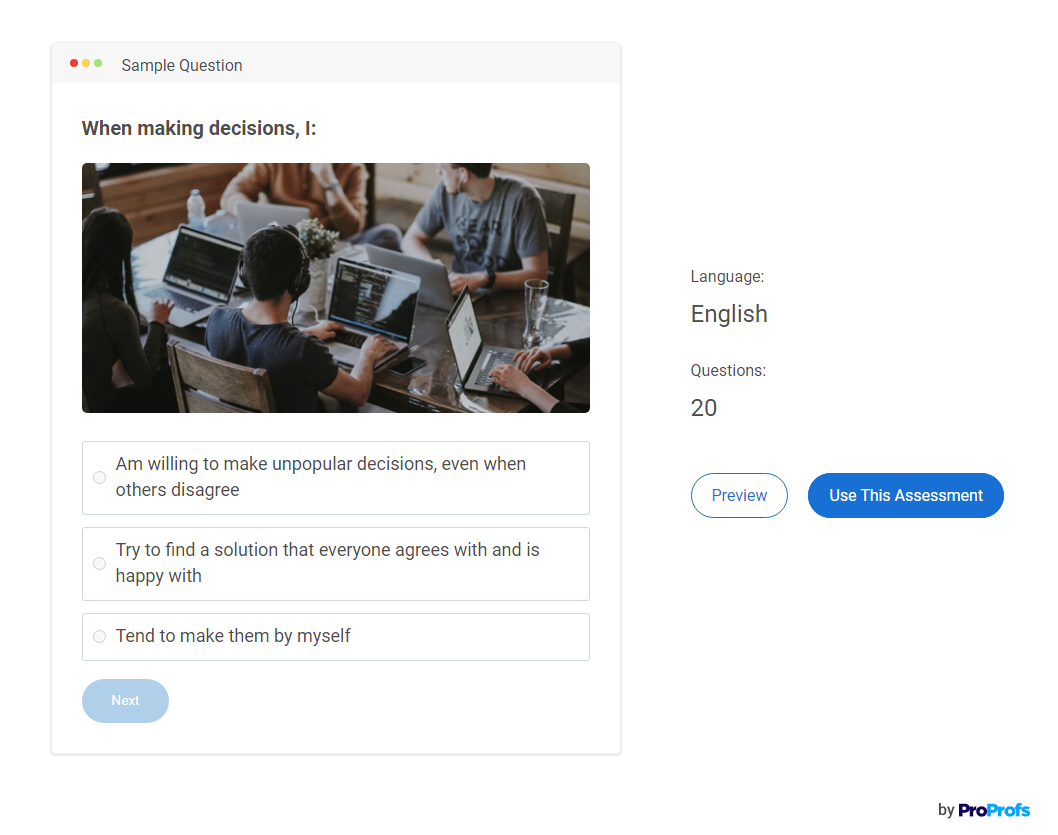
Formats vary: some are personality-based (like DISC or Big Five), while others use real-world scenarios, self-reflection, or peer feedback. In more complex cases, a Functional Behavioral Assessment (FBA) is used to observe someone on the job and identify what’s driving repeated challenges.
For example, if a high-performer suddenly struggles after a role change, an FBA might reveal unclear expectations or misaligned responsibilities—not a lack of ability.
Why Are Behavioral Assessment Tests Important?
Three out of four employers admit to making a bad hire — and each one costs them an average of $17,000, according to CareerBuilder. But the real damage goes deeper: stalled projects, broken team dynamics, and managers spending months trying to “coach up” someone who was never the right fit to begin with.
The problem isn’t always skills. It’s how someone responds to pressure, feedback, or ambiguity — things that don’t show up in resumes or interviews but show up quickly on the job.
That’s where behavioral assessments come in. They don’t just flag surface-level traits — they reveal patterns that affect day-to-day execution and team cohesion. For example, a candidate who consistently downplays accountability in scenario-based questions may struggle in a role that requires independent decision-making.
Used well, these assessments give managers a clearer picture of how someone is likely to behave — not just how they present. That makes them powerful not only for hiring, but for promotions, coaching, and even retention planning.
How to Conduct a Behavioral Assessment the Right Way
Most assessments fail because they try to measure everything — or the wrong things. The goal isn’t to catch someone off guard or check a box. It’s to understand how they operate in the kinds of situations that actually matter in your environment.
This section lays out how to approach that with precision — so the results reflect something real, not just rehearsed.
Step 1: Identify the Behaviors That Matter for the Role
Start by defining the behavioral traits that truly impact performance in the specific job. Instead of relying on general soft skills lists, work closely with team leads, high performers, and HR to determine which behaviors contribute to success and which ones lead to underperformance.
Generic traits like “good communicator” won’t cut it. Focus on observable behaviors that drive success or failure in your specific setting.
Use these methods:
- Behavioral Benchmarking: Review top performers in the same role. What do they consistently do well?
- Job Observation: Shadow someone in the role or speak with their manager to understand the day-to-day behavioral demands.
- Incident Analysis: Reflect on past situations where employees either excelled or failed in the role. What behaviors played a key role?
From this, identify 4–6 essential behaviors you’ll assess. For example:
- In a fast-paced support role: responsiveness, emotional regulation, multitasking
- In leadership: visioning, delegation, composure under stress
- In team-based environments: collaboration, empathy, accountability
Document each behavior with examples so that your team has a shared understanding of what you’re evaluating.
Step 2: Match Behaviors to the Right Question Formats
Once you’ve nailed down the traits, the next step is to select the best way to observe them in action. Don’t default to one question format across the board. Different behaviors show up in different ways.
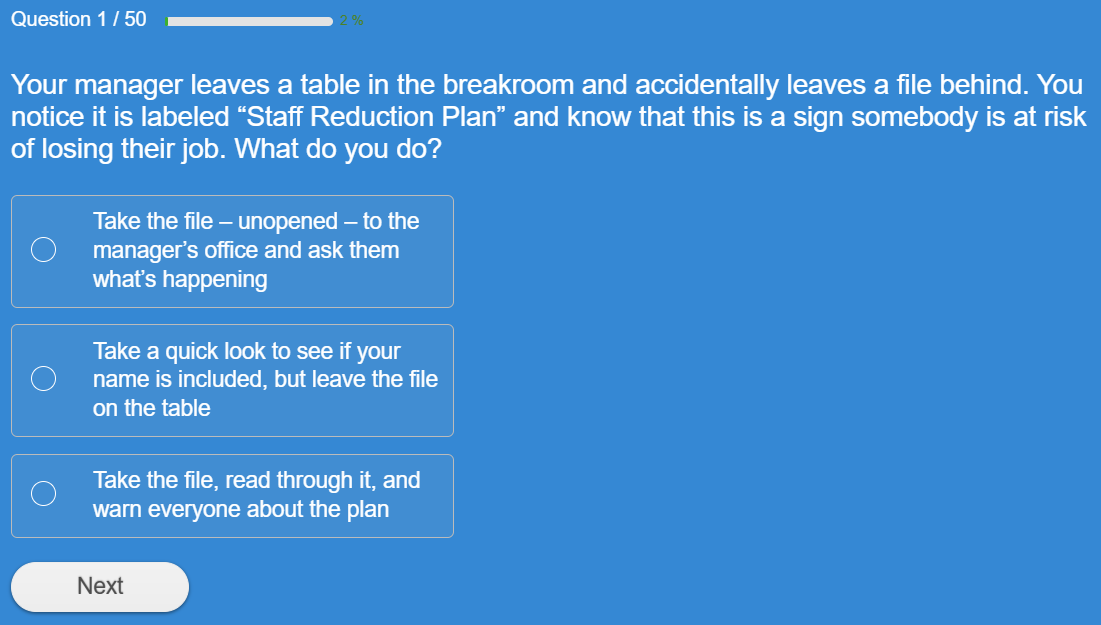
Here’s how to choose smartly:
- Use situational MCQs for traits like decision-making, ethical reasoning, and conflict resolution. These offer controlled variability, meaning you can present several clearly different behavioral responses to the same scenario and observe how the test taker thinks and acts.
- Apply Likert-scale questions (e.g., rating from “strongly disagree” to “strongly agree”) for self-perception behaviors such as stress response or adaptability. While self-reported, they can still offer insight—especially when used alongside other methods.
- Include essay prompts or video response options to see how people communicate under pressure, express empathy, or structure a response in their own words.
- Use ranking or prioritization tasks to test time management, focus, and critical thinking—especially in operational or managerial roles.
Don’t try to capture everything with one type. Mixing formats creates a more complete picture. And if you’re using an online tool, make sure it allows for question branching or logic flows (where the next question changes based on the test taker’s response) so the assessment can adapt in real time.
Step 3: Design Questions Around Real Job Scenarios
Effective behavioral assessment tests simulate real challenges. The aim is to see how someone would react—not just what they claim they believe.
To design your questions:
- Start with a real scenario someone in the role might face
- Keep it specific and detailed enough to mirror actual decision-making
- Avoid generic prompts like “How would you handle stress?”
Example (for project coordination):
You’re leading a project and realize one team member hasn’t completed their tasks, putting the deadline at risk. What do you do next?
Options should represent a range of behaviors: take initiative, escalate, ignore, compromise. The goal isn’t to trick participants—it’s to understand their instincts.
In your online quiz tool, you can bring these scenarios to life using:
- Personality quizzes that provide a detailed personality analysis
- Scenario descriptions with optional media (images, short video clips)
- Section-wise grouping for each core competency
- Ready-to-use quizzes for behavioral evaluations
- AI quiz generation for creating knowledge assessments
Watch: How to Create a Quiz Instantly Using AI
If your platform supports feedback after responses (like ProProfs does), you can use this to explain why certain responses align better with the role. This turns your quiz into a dual-purpose tool: assessment plus learning reinforcement.
Step 4: Pilot and Refine the Assessment Internally
Before using the assessment externally, pilot it with a small internal group. This isn’t just a quality check—it’s a strategic step to eliminate ambiguity, detect bias, and make sure you’re measuring what you intend to.
Run the assessment with employees at different levels:
- Ask for feedback on question clarity and scenario relevance
- Compare results across departments or experience levels
- Look for patterns in responses—do the high performers actually score higher?
During this test run, use your platform’s reporting tools to:
- Review how long participants spend on each question
- Identify any questions that nearly everyone gets “right” or “wrong”
- Export data to find inconsistencies or confusion around specific items
This refinement step makes your assessment more accurate and credible. Even small changes in question wording or answer framing can drastically improve the quality of insights you get later.
Step 5: Share the Assessment Thoughtfully
Once your behavioral assessment test is ready, how you share it matters just as much as what’s in it. Whether it’s for hiring or development, thoughtful delivery can improve both response quality and completion rates.
- Explain the why. Let participants know how the results will be used. Transparency encourages honest answers.
- Set expectations. Share how long it takes and whether they’ll receive feedback.
- Offer flexible access. Use email, secure links, or embed it in your portal. Ensure it works across devices.
With ProProfs Quiz Maker, you can:
- Share assessments via secure links or embedded widgets
- Control quiz visibility (public or private)
- Send automated invites and reminders
For hiring, send the assessment between resume screening and interviews. For employees, include it in a training program or performance review cycle.
Step 6: Evaluate Results With Context, Not Just Scores
Insights come from how you interpret the results—not just what they scored.
Here’s what to focus on:
- Behavior-level performance: Review how each trait was demonstrated, not just the overall score.
- Completion patterns: If someone rushes through critical questions, they may not be taking it seriously—or the item might be poorly framed.
- Response trends: Look for red flags like consistently avoiding confrontation or choosing extreme Likert options (e.g., always “strongly agree”).
Using ProProfs Quiz Maker, you can:
- View detailed reports per participant
- Download question-level and summary stats
- Use the grade book for team-wide analysis
- Track completion rates and drop-off points
- Track time spent by someone on the quiz and each question
Watch: How to Review Quiz Reports & Statistics
Step 7: Use Results for Development, Not Just Decisions
Behavioral assessment tests shouldn’t end with selection or scoring. The real value lies in how you use the insights to develop people and build stronger teams.
For hiring
Use the results to tailor interview questions. Instead of asking general questions, dig into the behaviors flagged by the assessment.
Example:
If the assessment shows low conflict tolerance, ask:
“Tell me about a time you had to confront a coworker—how did you approach it?”
This helps validate the results while giving candidates a chance to reflect on real experiences.
For employee development
Behavioral data can guide personalized coaching and training.
For instance:
- Someone scoring low on prioritization might benefit from a time management course.
- A team member struggling with adaptability may need more exposure to cross-functional roles or fast-paced projects.
For leadership planning
Use the assessment to identify leadership potential—not just based on output, but how people think, respond, and influence others.
Match assessment results with your organization’s leadership competencies and create a development path accordingly.
Want to Improve Your Leadership?
Tips:
- Combine assessment insights with manager reviews, peer feedback, and performance data.
- Link results to targeted learning or coaching plans.
- Compare pre- and post-assessment data to track growth.
- Reinforce strengths, not just flag gaps — growth builds on what’s working.
- Treat assessments as a starting point for development, not a final judgment.
Using Workplace Behavior Assessments Ethically and Legally
Behavioral assessments can be incredibly useful — but only if they’re used with care. Ask the wrong questions, use the results the wrong way, or skip a few key checks, and they stop helping.
They start hurting.
To use assessments responsibly and fairly, keep these principles in mind:
1. Make It Role-Specific
Assess only the behaviors that directly relate to success in the job. Avoid testing broad personality traits unless they clearly tie to performance.
2. Test for Bias Before You Launch
Run pilots with diverse groups. If certain populations consistently score lower, revisit your questions and scoring logic. Fairness isn’t just ethical — it’s legally essential.
3. Be Upfront With Participants
Tell people why they’re taking the assessment, how the results will be used, and whether they’ll see their feedback. Candidates and employees are less likely to game or mistrust a process that’s clearly explained.
4. Avoid One-Size-Fits-All Interpretations
Behavioral data can inform decisions but shouldn’t override interviews, peer input, or performance history. Use assessments to learn — not to label.
5. Account for Neurodiversity
Watch for assumptions baked into your questions. For example, equating extraversion with leadership potential can exclude strong candidates with quieter styles.
6. Protect Privacy and Access
Store results securely, limit visibility to relevant decision-makers, and avoid keeping data longer than necessary.
FREE. All Features. FOREVER!
Try our Forever FREE account with all premium features!
Which Traits Can Behavioral Assessment Tests Measure?
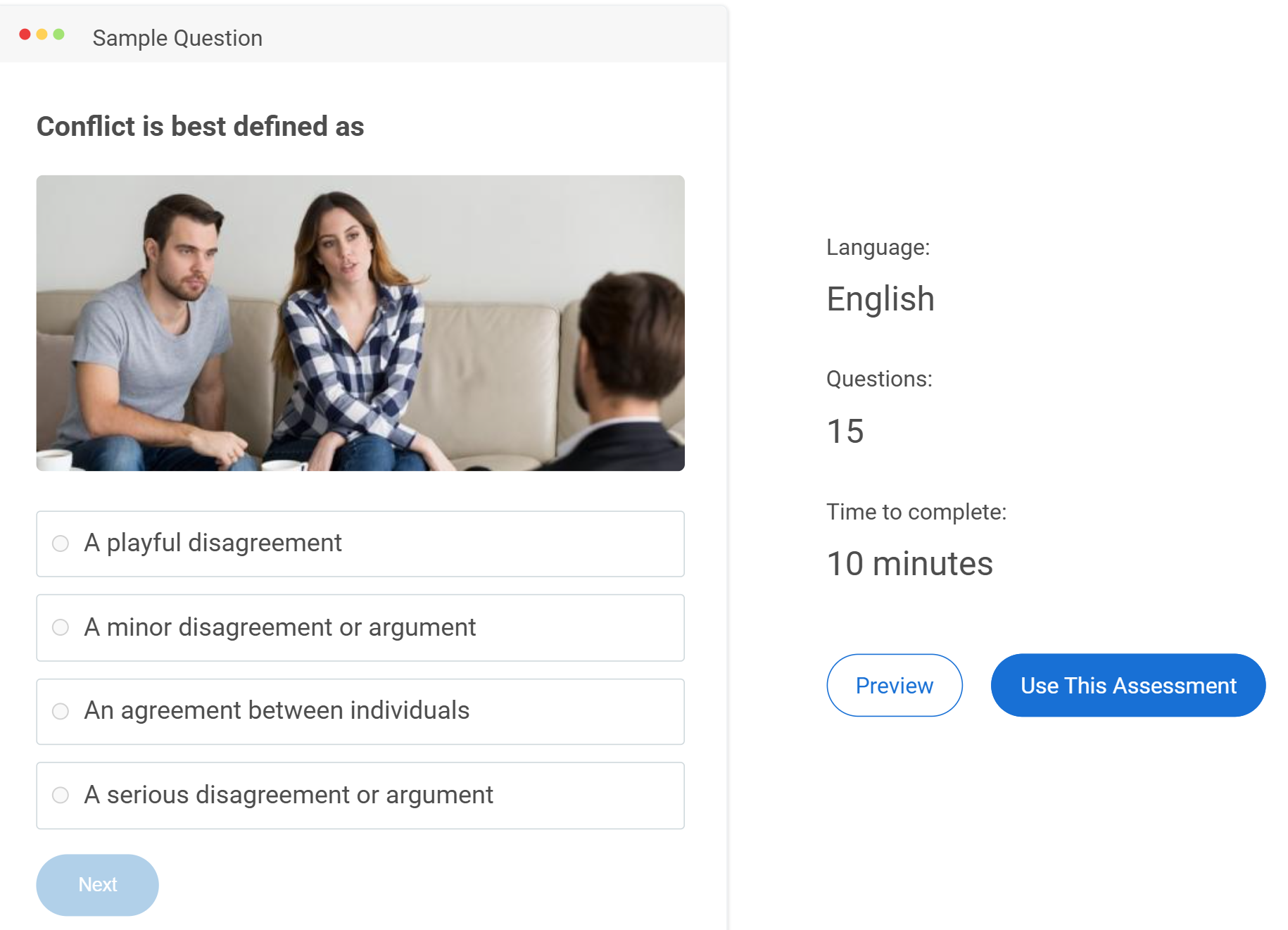
The most useful traits aren’t abstract personality labels — they’re the behaviors that show up when things get tense, unclear, or fast-moving. They explain why someone takes initiative… or disappears under pressure. Why they build trust — or quietly cause friction.
Here are the ones worth paying attention to:
- Personality Traits: Think openness, conscientiousness, extraversion, agreeableness, and emotional stability. These can hint at team fit or communication style — but don’t overread them. Without context, they can mislead.
- Cognitive Abilities: Problem-solving, reasoning, and decision-making. These show how someone handles ambiguity, makes calls when the answer isn’t obvious, or shifts from detail to the big picture.
- Emotional Intelligence: Self-awareness, empathy, and social skills. The people who de-escalate conflict and keep the team grounded? They’re usually scoring high here.
- Adaptability: Not just “flexible.” It’s how they respond when the process breaks, plans change, or things get messy.
- Communication Skills: It’s more than talking. Clarity, tone, listening — especially when something’s at stake or emotions are running high.
- Leadership Potential: Initiative. Calm under pressure. The ability to influence without steamrolling. These traits often show up long before a title does.
- Work Ethic and Motivation: Do they follow through without being chased? Stay consistent under stress? Or do they dip when no one’s watching?
- Team Collaboration: Can they work with different personalities? Share ownership? Know when to lead and when to support?
- Conflict Resolution: Do they avoid tough conversations? Escalate things? Or work through disagreement without drama?
- Stress Management: Can they stay functional when it’s all hitting at once — or do they check out, shut down, or burn out?
Types of Workplace Behavior Assessments
Not all behavioral assessments work the same way — and that’s a good thing. Different formats are better at measuring different things. Some tell you how people see themselves. Others show how they act in tough situations. The key is using the right type for what you want to uncover.
Here are some of the most common types used in the workplace:
1. Personality-Based Assessments
Tools like the Big Five or DISC give a snapshot of someone’s tendencies — how they process information, relate to others, or prefer to work. These are best used for understanding style, not predicting performance.
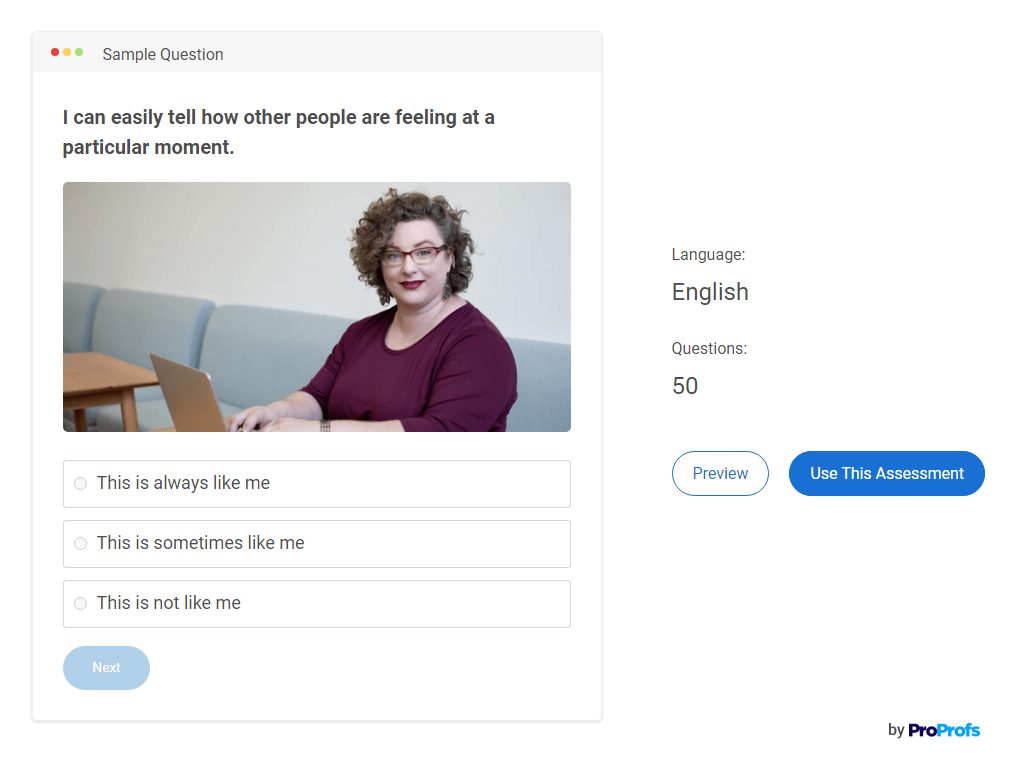
2. Situational Judgment Tests (SJTs)
These behavioral assessment tests present realistic workplace scenarios and ask people what they’d do. They’re especially helpful in hiring because they reveal instincts — how someone handles conflict, ethical dilemmas, or time pressure.
3. Cognitive & Emotional Intelligence Assessments
These look at how someone thinks and how they manage emotions. Use them when roles demand problem-solving under pressure or strong interpersonal awareness — like sales, leadership, or customer-facing jobs.
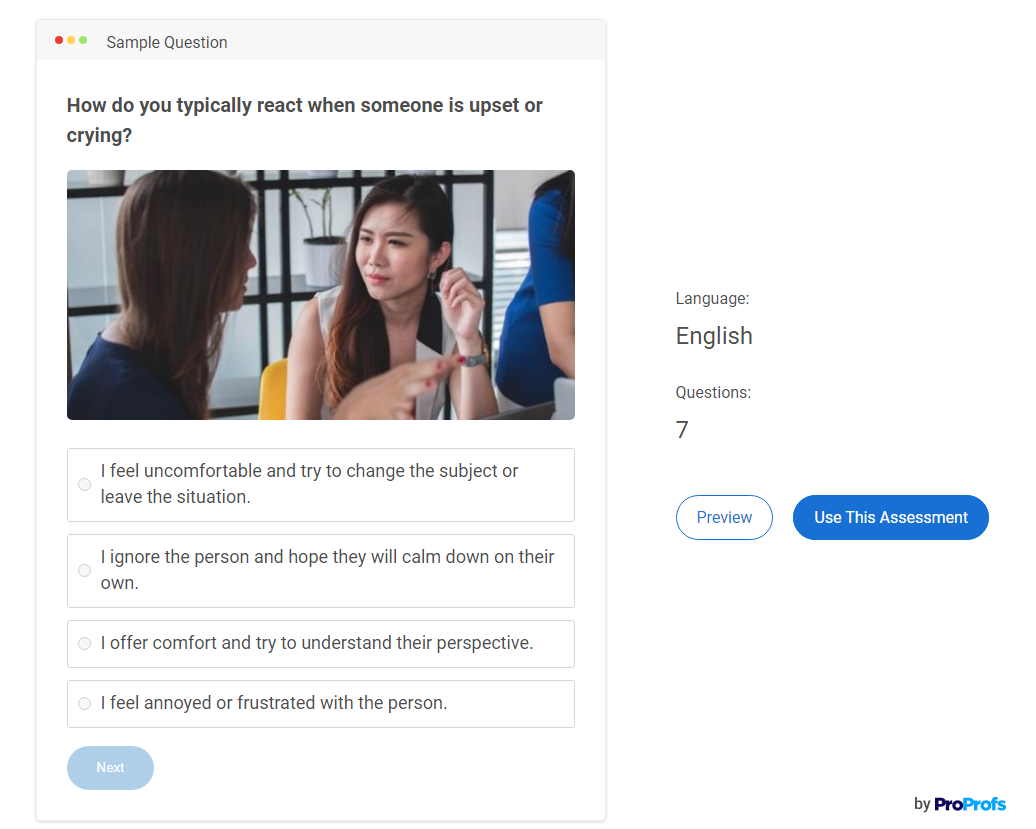
4. 360-Degree Feedback
Instead of a self-assessment, this pulls feedback from peers, managers, and reports. It’s a great tool for development, especially when you’re trying to build leadership maturity or self-awareness.
You can collect 360-degree feedback easily by creating employee surveys using an online survey tool like ProProfs Survey Maker. It lets you pick from 100+ ready-to-use and customizable survey templates or build surveys in seconds using an advanced AI question generator.
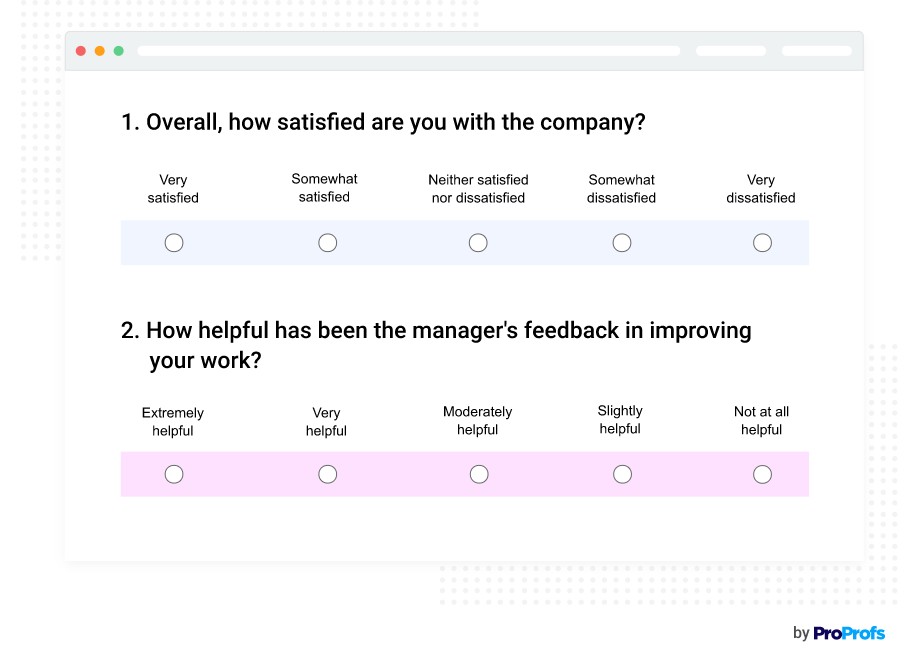
Watch: How to Create a Survey Using ProProfs Survey Maker
5. Behavioral Interviews
Structured questions that dig into past behavior: “Tell me about a time when…” They’re not new, but they still work — especially when paired with other assessment data.
6. Video Response Quizzes
These let candidates record answers to real-world prompts. They show how someone communicates when they’re not reading from a script — tone, clarity, confidence, and structure.
Watch: How to Create a Video Interview Quiz
https://www.youtube.com/watch?v=rCUJtji-SaI
7. Culture Add Assessments
Instead of asking, “Do they fit in?”, these ask, “What new strengths or perspectives might they bring?” Great for teams trying to grow in a more intentional direction.
8. Observational Assessments
Think role-play, job shadowing, or live simulations. These show how someone behaves in real time — ideal for promotions or high-stakes roles where behavior on the spot really matters.
When you’re conducting this type of assessment, here’s what you should look for:
- Communication style – Do they express ideas clearly? Listen actively? Maintain a respectful tone?
- Problem-solving approach – How do they handle challenges or unexpected issues?
- Decision-making – Are their choices thoughtful and informed or rushed and reactive?
- Time management – Do they prioritize tasks well and stay on schedule?
- Adaptability – How do they respond to feedback, changes, or pressure?
- Collaboration – Are they team players? Do they support others and resolve conflicts professionally?
- Emotional cues – Pay attention to body language, tone, frustration tolerance, and empathy.
9. Self-Report Surveys
These ask people to rate themselves on certain traits. Easy to scale, but best used alongside other tools — people often overestimate or downplay their own behavior.
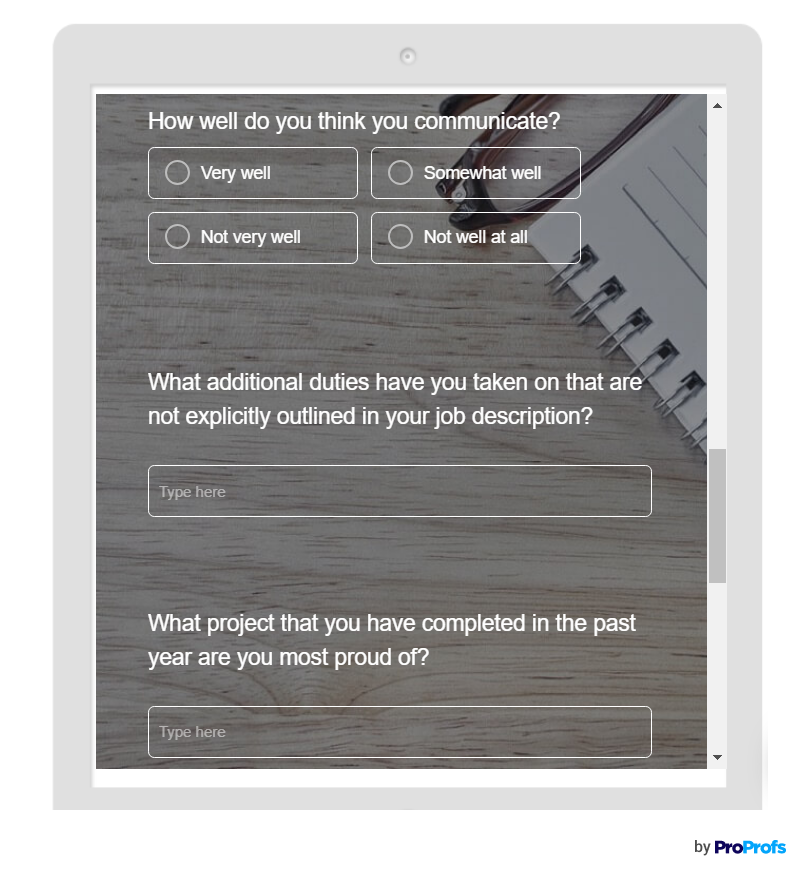
How to Choose the Right Behavioral Assessment Test
No single assessment works for every use case. The right one depends on what you need to learn, who you’re assessing, and how you’ll use the results. Ask yourself:
- Are we making a hiring decision or planning development?
- Do we need to measure behavior in action — or get a general sense of tendencies?
- Is this for an entry-level role, a leadership position, or team-wide alignment?
- Will the results stand alone or be paired with interviews and feedback?
When in doubt, combine formats. For example, pairing a situational judgment test with a video response quiz gives you both behavioral instincts and communication style — a much fuller picture.
Comparison Table: Types of Behavioral Assessments
| Assessment Type | What It Measures | Best Used For | Format |
|---|---|---|---|
| Personality-Based | Work style, preferences, interpersonal tendencies | Culture fit, communication alignment | Survey (e.g., DISC, Big Five) |
| Situational Judgment (SJT) | Decision-making, behavioral instincts | Hiring, screening for behavioral fit | Scenario-based MCQs |
| Cognitive & EI Assessments | Problem-solving, emotional intelligence | Leadership, analytical, client-facing roles | Timed tests or self-assessments |
| 360-Degree Feedback | Peer perception, leadership behavior | Development, coaching, succession planning | Anonymous peer surveys |
| Behavioral Interviews | Past behavior, lived experience | Hiring, validating assessment results | Structured interview questions |
| Video Response Quizzes | Communication, presence, critical thinking | Hiring, presentation-heavy roles | Asynchronous video submissions |
| Culture Add Assessments | Values, unique perspectives | Team-building, culture shaping | Open-ended prompts + surveys |
| Observational Assessments | Real-time behavior in action | Promotions, leadership roles | Role-plays, live tasks, simulations |
| Self-Report Surveys | Self-perception of traits | Development, pulse-checks | Likert-scale surveys |
Uses & Benefits of Behavioral Assessment Tests
When behavioral assessments are well-designed and used in context, they become more than just a screening tool — they become a decision-making advantage. From hiring to leadership planning, here’s how they deliver value across the employee lifecycle:
1. Stronger Hiring Decisions
Go beyond gut feel. Assessments reveal how candidates are likely to behave in real situations, helping you choose people who match both the role and the environment.
2. Fewer Bad Hires
Spot red flags early — before someone’s communication style, conflict habits, or stress response causes issues for the team. One misaligned hire can cost thousands in lost productivity and morale.
3. Faster Ramp-Up
New hires who align behaviorally with the role tend to onboard faster, collaborate more smoothly, and build trust with less friction.
4. More Targeted Development
Behavioral insights help managers coach with precision. Instead of vague feedback like “be more proactive,” you can focus on specific traits — like decision-making under pressure or accountability gaps.
5. Better Leadership Identification
Performance alone doesn’t predict leadership potential. Behavioral assessment tests can flag traits like composure, influence, and emotional intelligence that often signal readiness before it shows up on a résumé.
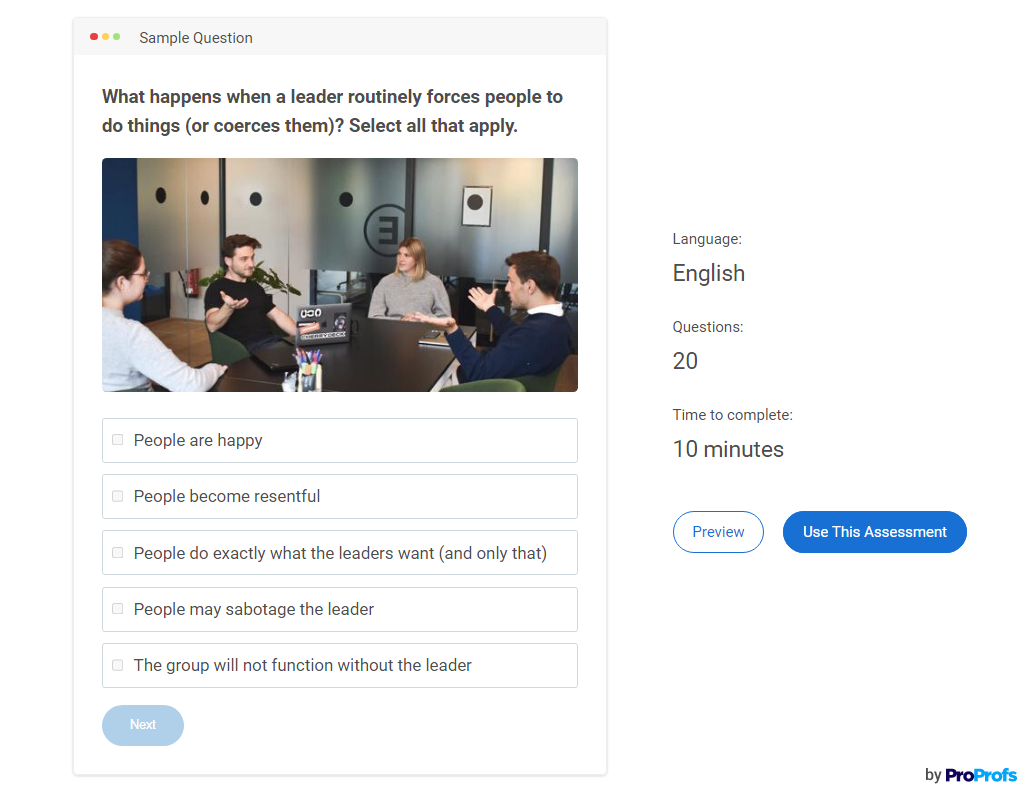
6. Smarter Succession Planning
Use assessment data to build leadership pipelines — not just based on output, but on behavior under stress, how people handle feedback, and how they influence others.
7. Improved Team Dynamics
Understand how team members communicate, collaborate, and manage conflict — and make smarter pairing, training, or restructuring decisions.
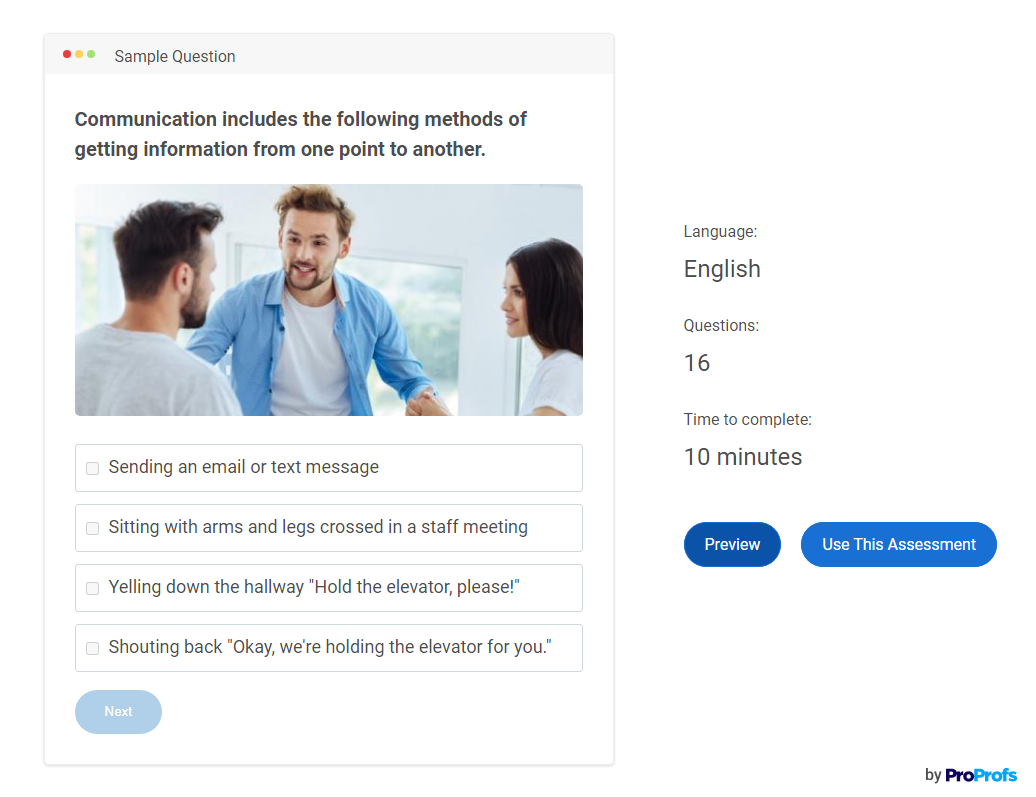
8. Higher Engagement and Retention
People who feel understood and supported — especially through assessments that lead to real development — tend to stay longer and perform better.
9. Clearer Performance Reviews
Bring behavioral data into performance conversations to make them more specific, less subjective, and easier to act on.
FREE. All Features. FOREVER!
Try our Forever FREE account with all premium features!
Examples of Behavioral Assessment Tests
Each behavioral assessment has its own design, purpose, and point of view. Some focus on work style, others on motivation or communication. The goal isn’t to use all of them — it’s to find the one that best fits your needs.
Here are five of the most widely used assessments, broken down so you can see exactly what each one offers.
1. DISC Assessment
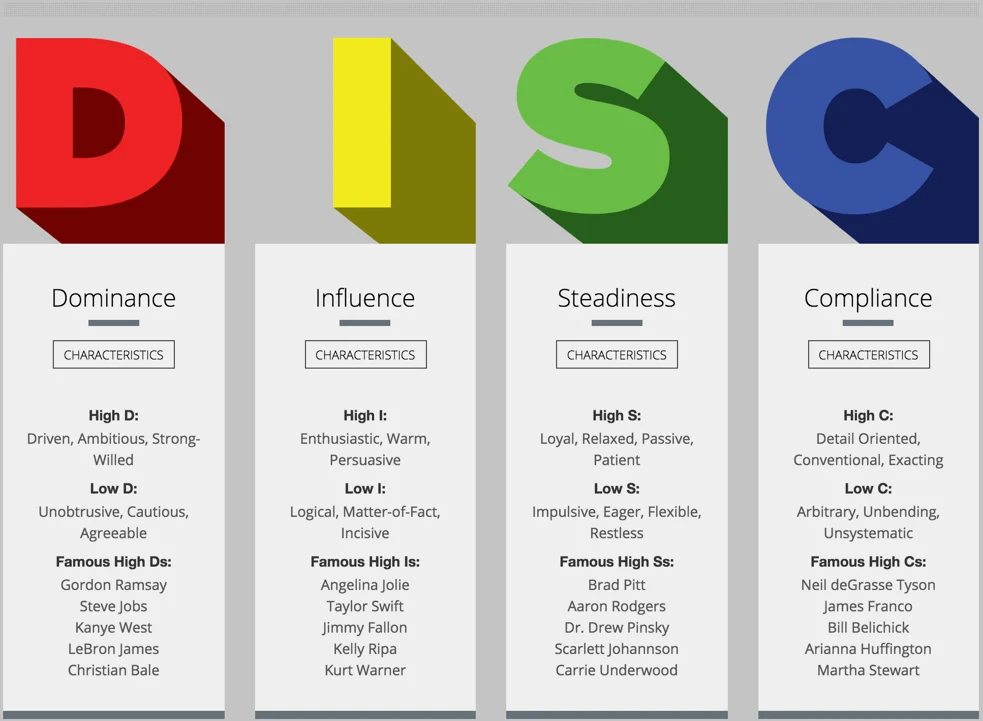
Image source: rmiexecutivesearch.com
The DISC model breaks behavior into four primary styles — Dominance, Influence, Steadiness, and Compliance. Based on the work of psychologist William Moulton Marston, it’s one of the most popular tools for improving workplace communication and team dynamics.
Used for: Communication training, team alignment, conflict resolution
What it reveals: A person’s dominant behavioral tendencies — how they respond to tasks, people, pace, and rules
How it works: Participants rate how well various statements describe them. The results reflect their dominant DISC type and possible secondary traits.
Example questions:
- “I enjoy taking charge in group situations.”
- “I prefer a steady routine over constant change.”
- “I follow rules closely, even when others don’t.”
2. Big Five Personality Test (OCEAN)
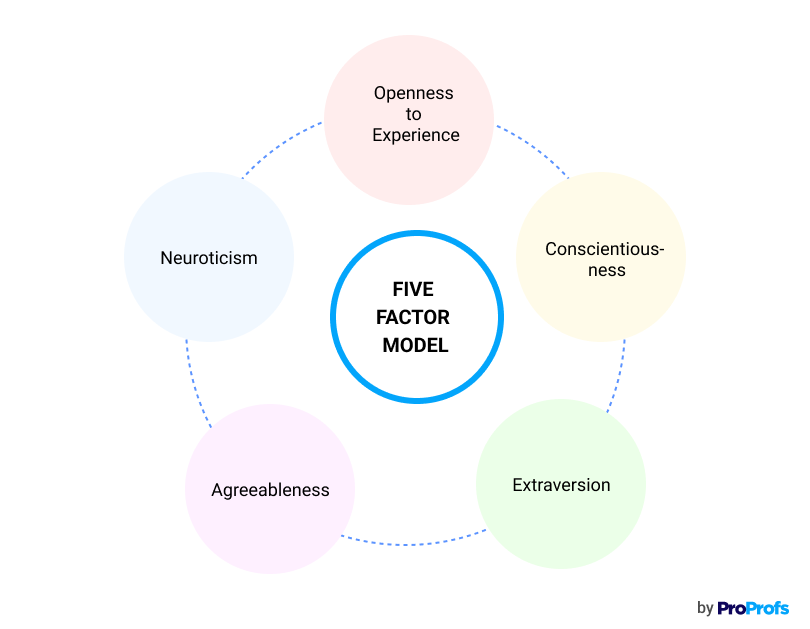
The Big Five (also known as OCEAN) is one of the most research-backed models in personality psychology. It measures five broad dimensions: Openness, Conscientiousness, Extraversion, Agreeableness, and Neuroticism.
Used for: Hiring, development, leadership coaching
What it reveals: Behavioral tendencies that influence how someone thinks, interacts, and copes with stress
How it works: Participants respond to self-assessment statements on a scale (e.g., “Strongly disagree” to “Strongly agree”). Results are plotted along five trait spectrums.
Example questions:
- “I get stressed out easily.”
- “I like to keep things organized.”
- “I enjoy trying new and unusual experiences.”
3. Culture Add Test
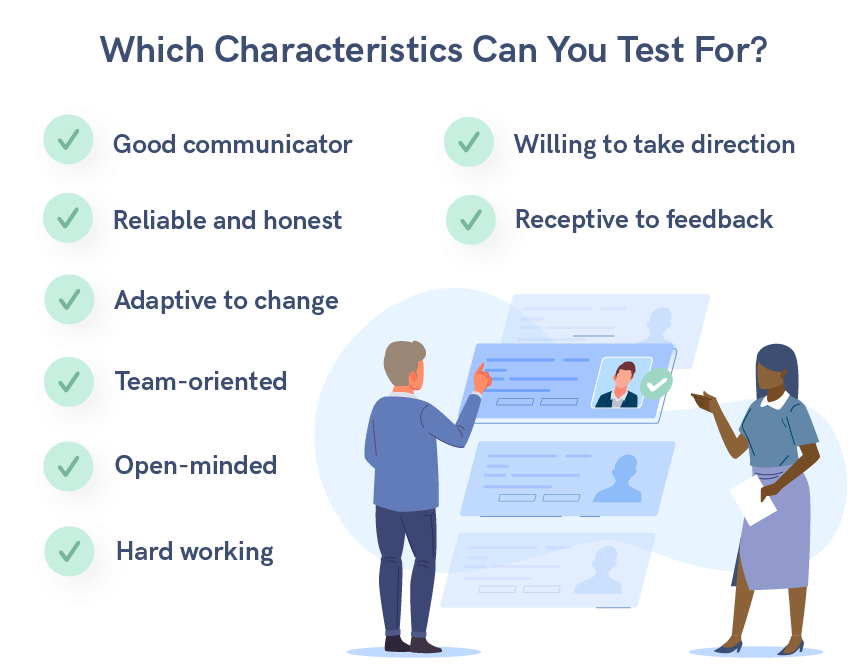
Image source: hiresuccess.com
This test is designed to evaluate how a candidate’s personal values and working style could expand — rather than simply match — your company culture. It reframes “culture fit” to avoid hiring for sameness.
Used for: Inclusive hiring, team design, values alignment
What it reveals: Whether someone will challenge or reinforce current norms and how their values complement the team’s
How it works: Candidates respond to value-ranking exercises, scenario prompts, or reflective questions that highlight what they prioritize in a workplace.
Example questions:
- “What values matter most to you in a team?”
- “Describe a time your personal values clashed with your work environment. How did you respond?”
- “What type of culture helps you thrive — and what type drains you?”
4. Enneagram
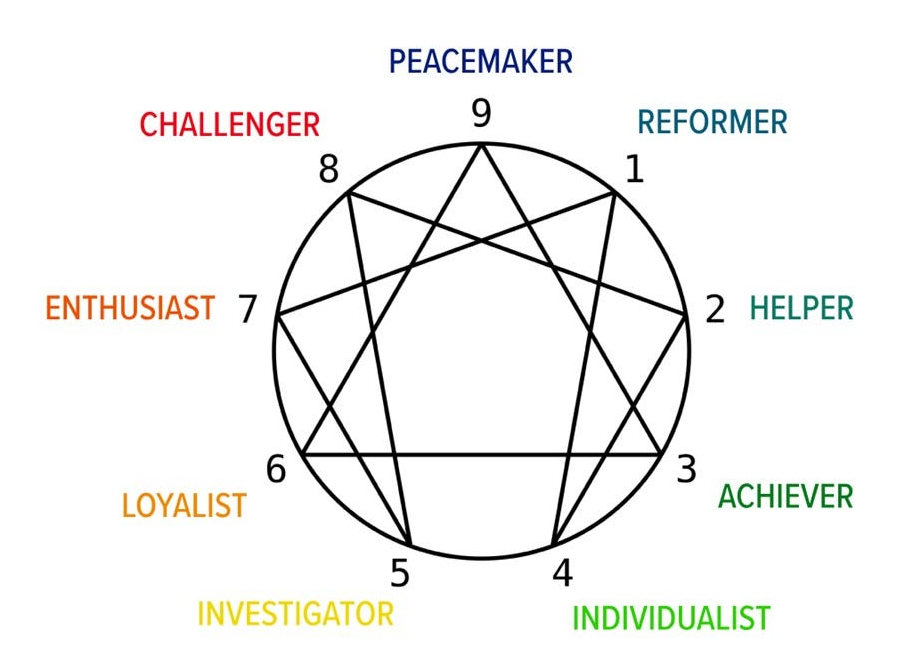
Image source: miro.medium.com
The Enneagram is a nine-type personality system rooted in motivation, fear, and coping style. It’s widely used in leadership coaching and team development to uncover deeper emotional drivers.
Used for: Emotional intelligence, leadership growth, self-awareness
What it reveals: Why people behave the way they do under stress, in relationships, or when faced with uncertainty
How it works: Participants choose between opposing or self-reflective statements. Based on their responses, they’re assigned a dominant type (e.g., Type 3: The Achiever, Type 9: The Peacemaker) along with growth recommendations.
Example questions:
- “I often feel the need to prove myself through achievement.”
- “I avoid conflict, even when something bothers me.”
- “I focus more on helping others than meeting my own needs.”
5. 16 Types (MBTI-Inspired)
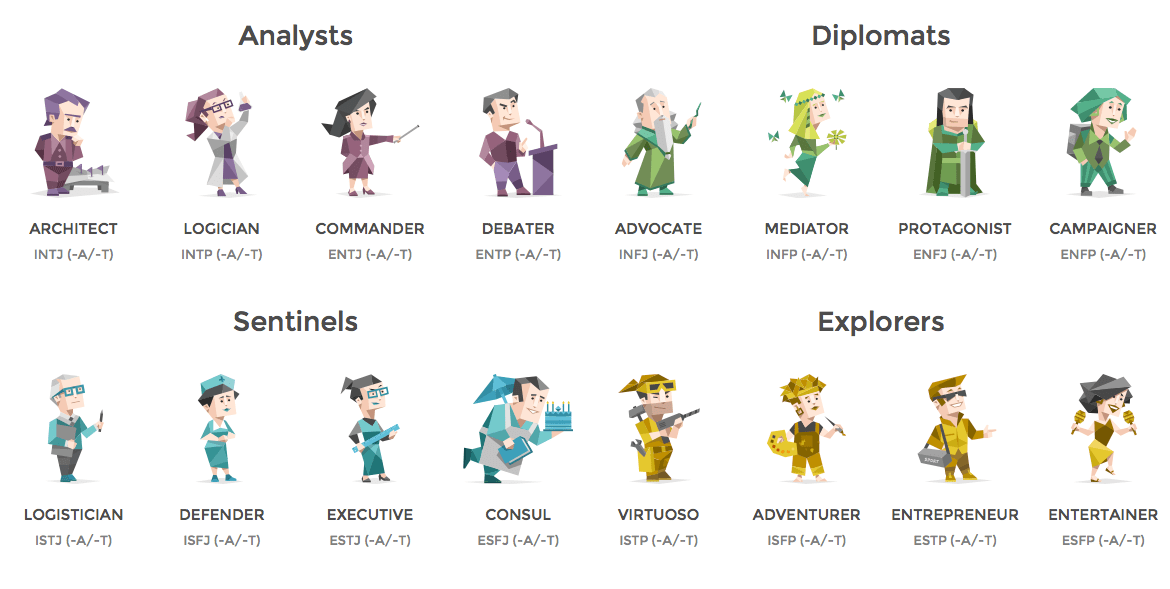
Image source: miro.medium.com
Inspired by the Myers-Briggs Type Indicator and Carl Jung’s theory of psychological types, this test places individuals into one of 16 profiles based on four cognitive preference pairs (e.g., Thinking vs. Feeling).
Used for: Career development, coaching, communication insights
What it reveals: How people prefer to process information, make decisions, and relate to others
How it works: Participants answer paired-choice questions that map them to one of 16 types (e.g., INFP, ESTJ). The results describe natural strengths and challenges.
Example questions:
- “Do you make decisions based more on logic or personal values?”
- “Do you prefer a planned schedule or flexibility?”
- “Do you get energy from group interaction or solo reflection?”
How It Works:
It works through self-evaluation in the following areas:
- Dominance: How strong-willed or confident employees are about their work
- Influence: How influential or inspiring they are to others and whether or not they’re capable of building meaningful professional relationships
- Steadiness: How stable, consistent, and dependable they are
- Compliance: How task-oriented, cautious, and accurate they are based on their expertise
The DISC test identifies the main personality type of an employee and how they are likely to behave in the workplace. It enables employees to understand themselves better and how they interact with those around them.
Participants self-assess by rating themselves on a scale of 1 (very inaccurate) to 5 (very accurate) on a series of statements about their personality.
Example Question Statements:
- I am always confident about my work
- I like meeting new people
- I am dependable in the workplace
- I prefer doing a task right, not just finishing it
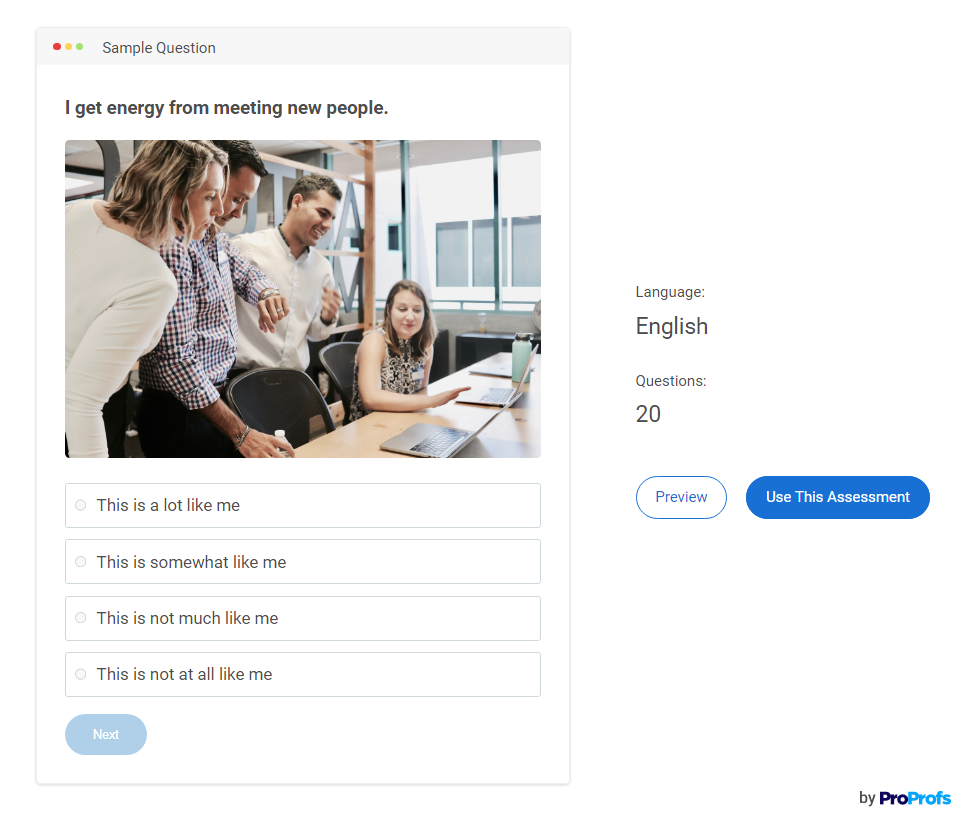
Create & Deliver Behavioral Assessments That Work
Strong teams don’t come from guesswork. Whether you’re making a hiring call, deciding who’s ready to lead, or planning targeted development, behavioral assessment tests give you the visibility you need to make those decisions with intent.
ProProfs Quiz Maker lets you build assessments that go beyond surface-level answers. You can create custom tests that reflect the roles you’re hiring for, the traits you want to grow, and the behaviors that actually matter day to day. Or, choose from ready-made templates built by experts in behavioral science and workplace psychology.
From evaluating how someone handles pressure to how they collaborate or make decisions, ProProfs gives you the tools to assess behavior in context — and the reporting to turn that insight into action.
Frequently Asked Questions
Can behavioral assessments be used for all job roles, or are they specific to certain industries?
Behavioral assessment tests are highly versatile and can be adapted to virtually any role or industry. Whether you're hiring a customer service agent, promoting a team leader, or evaluating senior executives, the core behaviors—like communication, decision-making, adaptability, or accountability—are relevant across functions. What changes is the context and weighting of those traits, which is why assessments should be tailored to fit the behavioral demands of each role.
How do behavioral assessment tests work?
Behavioral assessment tests evaluate individuals' responses to specific scenarios, questions, or tasks designed to reveal their behavioral traits, attitudes, and competencies. These assessments often include a mix of personality tests, cognitive tests, and situational judgment tests. The results provide insights into how individuals are likely to behave in various work-related situations, helping employers understand their strengths, weaknesses, and potential fit within the organization.
Why use behavioral assessment tests in the workplace?
Behavioral assessment tests help organizations make better hiring decisions by matching candidates with job roles and company culture. They also support employee development by identifying growth areas for targeted training. Additionally, these assessments improve retention by ensuring a strong role fit, leading to greater job satisfaction and reduced turnover. Overall, they enhance workforce alignment and performance.
How can behavioral assessment tests help in recruitment?
Behavioral assessment tests enhance recruitment by identifying candidates whose traits align with role requirements, reducing hiring mistakes through deeper personality insights, and improving interview effectiveness by informing targeted questions. This leads to more accurate, confident hiring decisions and stronger candidate-role fit.
How often should I conduct behavioral assessment tests?
Conduct behavioral assessments during hiring, annually during performance reviews, before promotions, and periodically for team development. This ensures consistent role alignment, supports employee growth, informs promotion decisions, and fosters stronger team dynamics and collaboration.

 We'd love your feedback!
We'd love your feedback! Thanks for your feedback!
Thanks for your feedback!







